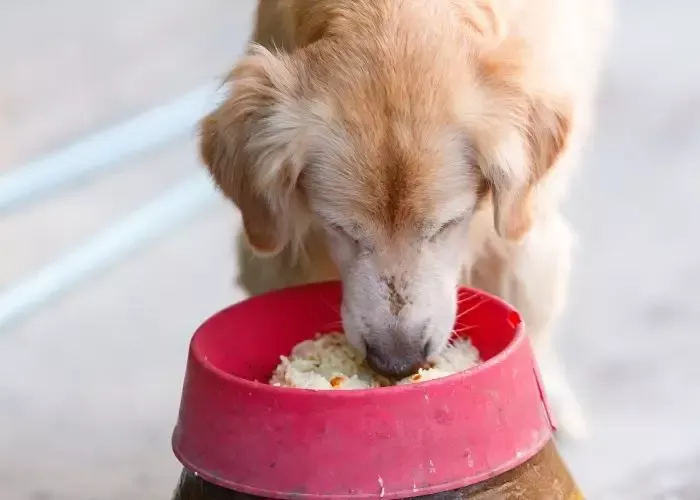One of the most common questions dog owners ask is whether their furry friend can eat rice every day. Given that rice is a staple food in many cultures and is often used as a filler in commercial dog food, this is a legitimate concern. In this article, I will explore the nutritional value of rice for dogs, the potential benefits and drawbacks of feeding rice to dogs, and whether dogs can eat rice every day.
What is rice and why is it used in dog food?
Rice is a cereal grain that is a staple food for more than half of the world’s population. It is a good source of carbohydrates, which provide energy for the body. Rice is also low in fat and contains essential vitamins and minerals such as thiamine, niacin, vitamin D, calcium, and iron. Due to its nutritional value and versatility, rice is commonly used in dog food as a source of carbohydrates and fiber.
Rice is often used in dog food because it is easily digestible, which means that it can be broken down and absorbed by the body quickly and efficiently. This is important for dogs because they have a shorter digestive tract than humans, which means that they need food that can be digested quickly to avoid digestive issues such as bloating and constipation. Additionally, rice is a good source of fiber, which can help regulate bowel movements and promote digestive health.
The Nutritional Value of Rice for Dogs
Dogs require a balanced diet that contains protein, fat, carbohydrates, vitamins, and minerals. Rice is a good source of carbohydrates, but it is not a complete source of nutrition for dogs. Dogs require high-quality protein to build and maintain muscle tissue, and they also need essential fatty acids for healthy skin and coat. Therefore, it is important to supplement rice with other sources of protein and fat to ensure that dogs receive a balanced diet.
In addition to carbohydrates, rice also contains some essential vitamins and minerals that are important for a dog’s health. For example, rice is a good source of thiamine, which is important for maintaining a healthy nervous system, and niacin, which is important for maintaining healthy skin and a healthy digestive system. Rice also contains small amounts of vitamin D, calcium, and iron, which are important for bone health, blood health, and overall immune system function.
Benefits of Feeding Rice to Dogs
Rice can provide several benefits to dogs when fed in moderation. Some of these benefits include:
Digestive Health: Rice is a good source of fiber, which can help regulate bowel movements and promote digestive health. It can also help alleviate diarrhea and constipation in dogs.
Energy: Rice is a good source of carbohydrates, which can provide dogs with the energy they need to stay active and healthy. This is especially important for working dogs or dogs that are highly active.
Weight Management: Rice is low in fat and calories, which makes it a good option for dogs that need to lose weight or maintain a healthy weight. This is because it can provide dogs with the energy they need without adding excess calories to their diet.
Drawbacks of Feeding Rice to Dogs
While rice can provide some benefits to dogs, there are also some potential drawbacks to consider. These include:
Allergies: Some dogs may be allergic to rice or develop an intolerance to it over time. Signs of an allergic reaction to rice may include itching, hives, vomiting, and diarrhea. If a dog experiences any of these symptoms after eating rice, it is important to stop feeding them rice and consult with a veterinarian.
Nutritional Imbalance: Rice is not a complete source of nutrition for dogs, and feeding it as the sole source of carbohydrates can lead to nutritional imbalances. Dogs require a balanced diet that includes high-quality protein and essential fatty acids. Therefore, it is important to supplement rice with other sources of protein and fat to ensure that dogs receive a balanced diet.
Dental Health: Feeding dogs a diet that is high in carbohydrates, such as rice, can contribute to dental problems such as tooth decay and gum disease. This is because carbohydrates can stick to a dog’s teeth and provide a food source for bacteria, which can lead to dental issues over time. Therefore, it is important to ensure that a dog’s diet includes a variety of foods that promote dental health, such as raw bones and dental chews.
Is it Okay for Dogs to Eat Rice Every Day?
Feeding dogs rice every day is not necessarily harmful, but it is important to do so in moderation and to supplement rice with other sources of protein and fat. Dogs require a balanced diet that meets their nutritional needs, and feeding rice as the sole source of carbohydrates can lead to nutritional imbalances. It is also important to consider the potential drawbacks of feeding rice to dogs, such as allergies and dental problems.
Conclusion
In conclusion, rice can be a beneficial addition to a dog’s diet when fed in moderation and supplemented with other sources of protein and fat. However, it is important to consider the potential drawbacks of feeding rice to dogs, such as allergies and nutritional imbalances. As with any dietary changes, it is important to consult with a veterinarian before making any significant changes to a dog’s diet. By providing a balanced diet that meets their nutritional needs, dog owners can help ensure that their furry friends stay healthy and happy for years to come.
Related Topics:


